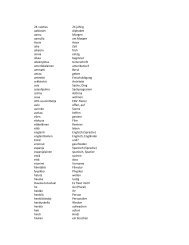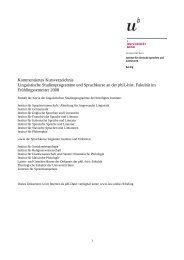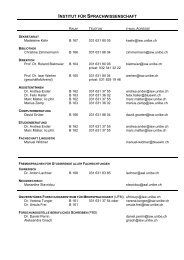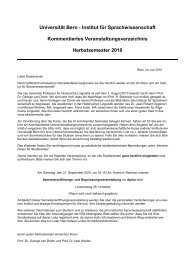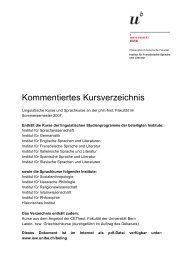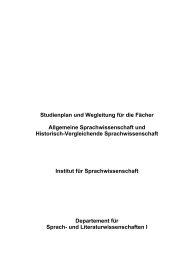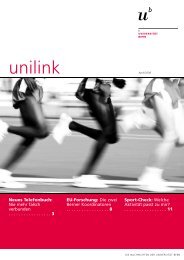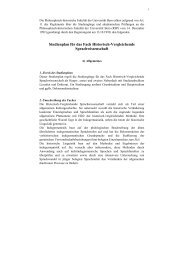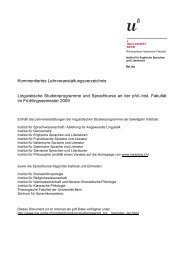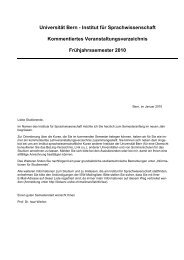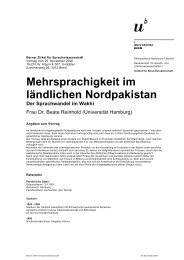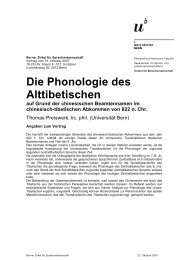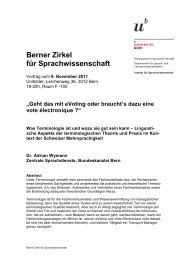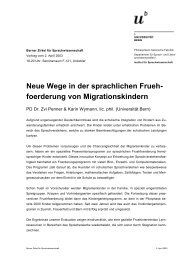The expression of modality in Korean - Institut für ...
The expression of modality in Korean - Institut für ...
The expression of modality in Korean - Institut für ...
Create successful ePaper yourself
Turn your PDF publications into a flip-book with our unique Google optimized e-Paper software.
2<br />
<strong>The</strong> result<strong>in</strong>g problems concern<strong>in</strong>g any work on <strong>modality</strong> are summed up <strong>in</strong> similar ve<strong>in</strong> by<br />
Perk<strong>in</strong>s (1983):<br />
„Do<strong>in</strong>g research on <strong>modality</strong> is very similar to try<strong>in</strong>g to move <strong>in</strong> an overcrowded<br />
room without tread<strong>in</strong>g on anyone else’s feet.“ (Perk<strong>in</strong>s 1983, 4)<br />
This <strong>in</strong>tricate „maze“, to take up Jongeboer’s phras<strong>in</strong>g, <strong>of</strong> def<strong>in</strong>itorial problems and<br />
difficulties is due to a number <strong>of</strong> circumstances. One <strong>of</strong> these is the fact that <strong>modality</strong> is the<br />
subject <strong>of</strong> more than one scientific discipl<strong>in</strong>e, namely logic and l<strong>in</strong>guistics. Seem<strong>in</strong>gly one <strong>of</strong><br />
the first people known to have written about what we now refer to as <strong>modality</strong> was Aristotle;<br />
his thoughts on notions such as necessity and possibility versus impossibility came to be the<br />
basis on which modal logic stands. Modality, therefore, is a prime object <strong>of</strong> logic analysis and<br />
as such has a long tradition. However, as the science <strong>of</strong> logic is commonly associated with<br />
stat<strong>in</strong>g what one might term the „laws <strong>of</strong> thought“ and the <strong>expression</strong> <strong>of</strong> thoughts is obviously<br />
the core task <strong>of</strong> language, it is neither difficult to see nor understand why l<strong>in</strong>guistics should<br />
also have come to f<strong>in</strong>d itself confronted with the phenomenon <strong>of</strong> <strong>modality</strong>. While one may<br />
well argue (such as Pedersen (1989)) that <strong>modality</strong> is central to both the study <strong>of</strong> logic and the<br />
study <strong>of</strong> language, it seems obvious <strong>in</strong> my view that, <strong>in</strong> most cases and despite some<br />
parallelisms (e.g. term<strong>in</strong>ological and, to a certa<strong>in</strong> extent, conceptual) the actual objects as<br />
much as the <strong>in</strong>terests and goals <strong>of</strong> a l<strong>in</strong>guistic analysis <strong>of</strong> <strong>modality</strong> are fundamentally different<br />
from a logic analysis <strong>of</strong> <strong>modality</strong>. What modal logic does <strong>in</strong> this respect, if we take up<br />
Herslund’s (1989) résumé, is to<br />
„isolate certa<strong>in</strong> parts <strong>of</strong> sentences and restate them <strong>in</strong> a formalised way thereby<br />
mak<strong>in</strong>g it possible to calculate, and state precisely, the mean<strong>in</strong>g relations between<br />
sentences. (...) modal logic does not necessarily mirror natural language, but (...)<br />
important analogies exist.“ (Herslund 1989, 11)<br />
This then is a quantification <strong>of</strong> <strong>modality</strong>, accomplished by the use <strong>of</strong> „formal mach<strong>in</strong>ery<br />
which is the trademark <strong>of</strong> twentieth century modal logic“ (Perk<strong>in</strong>s 1983, 6). <strong>The</strong>re are<br />
l<strong>in</strong>guistic approaches to analyz<strong>in</strong>g <strong>modality</strong> which are, either explicitly or implicitly,<br />
congenial to approaches <strong>of</strong> modal logic, such as e.g. Kratzer (1991) 2 . <strong>The</strong>re is, however, a<br />
great deal more to the l<strong>in</strong>guistic study <strong>of</strong> <strong>modality</strong> than only a logical dimension, and <strong>in</strong> this<br />
study, the emphasis will be decidedly on what one might call the notional dimension <strong>of</strong><br />
<strong>modality</strong>. This view <strong>of</strong> <strong>modality</strong> does not primarily classify concepts such as possibility and<br />
2 Kratzer’s approach is congenial to modal logic <strong>in</strong> that her theory <strong>of</strong> <strong>modality</strong> is based on the ma<strong>in</strong> assumption<br />
that <strong>modality</strong> should be viewed as restricted quantification over so-called possible worlds (denot<strong>in</strong>g <strong>in</strong> effect<br />
possible states <strong>of</strong> affairs or situations), and quantification (<strong>of</strong> <strong>modality</strong>) is also at the centre <strong>of</strong> modal logic.



